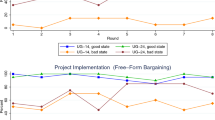Abstract
This paper analyzes a two-stage model of bilateral bargaining where one of the agents has the option to delegate. A first approach is to assume that the contract between the agent and his representative is perfectly observable and can be renegotiated. Commitment effects arise although renegotiation is possible. Then, perfect observability of the contract is weakened to observe it with certain probability. Commitment effects as pure-strategy equilibria exist if this probability is sufficiently close to 1, in contrast to Bagwell's [1995] findings that imperfect observability undermines commitment. Considering the realistic case of the actual agreement between two parties being private information, the commitment value as equilibrium outcome disappears since having closed a renegotiation-proof contract offers costless self-insurance against strategic misunderstandings.
Similar content being viewed by others
References
Bagwell, K. "Commitment and Observability in Games,"Games and Economic Behavior, 8, 1995, pp. 221–80.
Caillaud, B.; Julien, B.; Picard, P. "Competing Vertical Structures: Precommitment and Renegotiation,"Econometrica, 63, 1995, pp. 621–46.
Dewatripont, M. "Commitment Through Renegotiation-Proof Contracts with Third Parties,"Review of Economic Studies, 55, 1988, pp. 377–90.
Fershtman, C.; Judd, K.; Kalai, E. "Observable Contracts: Strategic Delegation and Cooperation,"International Economic Review, 32, 1991, pp. 551–60.
Fershtman, C.; Kalai, E. "Unobserved Delegation,"International Economic Review, 38, 1997, pp. 763–74.
Harsanyi, J.; Selten, R.A General Theory of Equilibrium Selection in Games, Cambridge, MA: MIT Press, 1988.
Katz, M. L. "Game-Playing Agents: Unobservable Contracts as Precommitments,"The Rand Journal of Economics, 22, 1991, pp. 307–28.
Kessler, A. "The Value of Ignorance,"The Rand Journal of Economics, 29, 1998, pp. 339–62.
Mertens, J. F. "Two Examples of Strategic Equilibrium,"Games and Economic Behavior, 8, 1995, pp. 378–88.
Rubinstein, A. "Perfect Equilibrium in a Bargaining Model,"Econometrica, 50, 1982, pp. 97–109.
Schelling, T. C. "An Essay on Bargaining,"American Economic Review, 46, 1956, pp. 281–306.
__.The Strategy of Conflict, New York, NY: Oxford University Press, 1960.
Selten, R. "Reexamination of the Perfectness Concept for Equilibrium Points in Extensive Games,"International Journal of Game Theory, 4, 1975, pp. 25–55.
Ståhl, I.Bargaining Theory, Stockholm, Sweden: Stockholm School of Economics, 1972.
Author information
Authors and Affiliations
Additional information
The author is grateful for helpful comments from Vasco Santos, participants at the International Atlantic Economic Conference, October 7–10, 1999, Montreal, Canada, an anonymous referee, and David M. Aadland.
Rights and permissions
About this article
Cite this article
Lang, G. Bargaining and the observability of contractual commitments via third parties. International Advances in Economic Research 7, 213–230 (2001). https://doi.org/10.1007/BF02296010
Issue Date:
DOI: https://doi.org/10.1007/BF02296010




